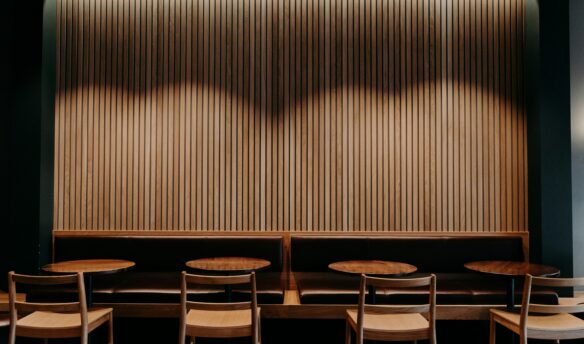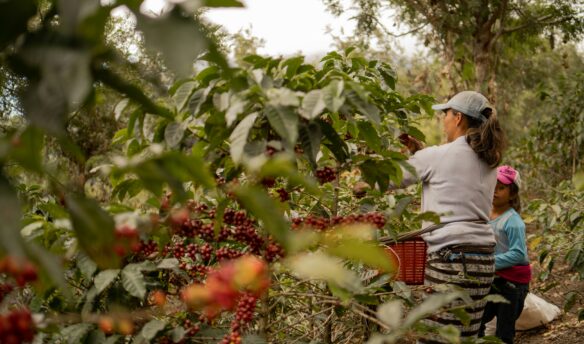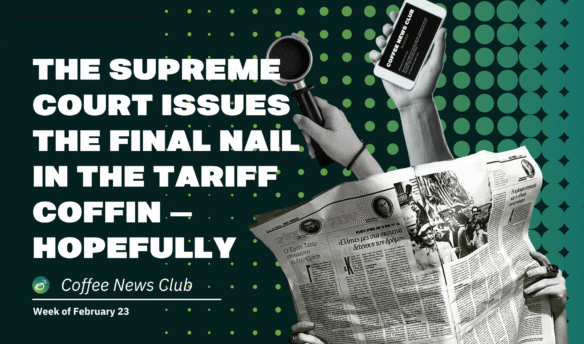Every week, we send out a newsletter recapping the week’s biggest coffee stories—it’s one of our most popular Fresh Cup verticals and now we’re here to recap what made coffee in 2024: Surging coffee prices, cutthroat corporate competition, and another big year for the coffee labor movement—here’s the Fresh Cup 2024 Coffee News Year in Review.
Surprised you missed any of these headlines? Don’t miss a single headline in 2025: subscribe here.
The Year in Coffee
Arguably the biggest story this year was about coffee pricing. Prices for arabica and robusta coffee rose exponentially all year, and the commodity futures market reached an all-time high in early December.
Farmers felt the impact of rising prices throughout the year: In February, robusta farmers in Vietnam tried to renegotiate contracts—and prices—that they had agreed to before the surge began. And in September, Ugandan farmers hired extra security to protect their coffee from being stolen.
One of the reasons prices rose was the European Union’s impending deforestation legislation, which was due to go into effect at the end of 2024. Companies and farmers worried that complying with the law would be too onerous, and those fears put upward pressure on the cost of coffee. In the end, after lobbying efforts from coffee organizations and big businesses, the EU decided to delay implementation.
Corporate coffee news in 2024 was dominated by the contrasting fortunes of two of the world’s largest coffee companies. At the end of 2023, Luckin Coffee reemerged—after scandals that had led it to be delisted from the Nasdaq [in year]—to dominate China’s coffee scene. That momentum continued into 2024, as its low-cost approach inspired a price war with its competitors. The company usually came out on top: How can you compete with a 99-cent cup of Gesha coffee?
Luckin opened more than 1,300 locations in a single quarter, which meant it needed more coffee. In November, the company signed a multi-billion-dollar coffee-sourcing deal with the government of Brazil. It also began eyeing expansion to the United States, possibly in order to capitalize on the struggles of one of its main rivals.
It’s fair to say that 2024 was not the best year for Starbucks. Lagging sales and falling stock prices led the board to fire the CEO, Laxman Narasimhan, just 17 months after he took the job. His replacement, former Chipotle boss Brian Niccol, promised to return to Starbucks’ coffeehouse roots after the brand had spent several years transitioning to a drive-thru-focused quick-service company.
Coffee research also flourished in 2024, whether focused on coffee’s economic, biological, or chemical foundations. In June, a study examined how value is distributed across the coffee industry. Using the German coffee market as an example, the report found that coffee generates enough value to support the entire industry—it is just concentrated at the consuming end of the supply chain.
In April, researchers discovered that arabica has been around a lot longer than we thought—in fact, they put its age at more than 600,000 years old. And in October, scientists at the UC Davis Coffee Center released an all-new Coffee Brewing Chart, updating the iconic chart that had been in use for nearly seven decades.
In November, the Specialty Coffee Association (SCA) formally adopted new cupping standards, which aim to bring a more rounded, holistic approach to the practice of assessing coffee’s value. The SCA has big goals for the new form, saying that it hoped the updated standards would “unify the approach to defining and appreciating top-quality specialty coffees, ushering in a new era for the industry.” Basically, it hopes to move away from “a singular coffee score” that defines the quality or value of a coffee.
Coffee and the Climate Crisis
Another reason for the sharp rise in coffee prices this year was weather.
Many of the largest coffee-growing regions suffered from extreme weather in 2024—just like the year before. Wildfires raged across much of South America and burned coffee farms in Brazil during the worst drought to hit the country in more than 70 years. Brazil also experienced unseasonable frosts, all of which contributed to a fall in production. Because Brazil is the world’s largest coffee grower, the country’s weather events had a significant impact on global coffee prices.
Brazil wasn’t alone. Devastating floods hit countries like Honduras and Costa Rica while much of Southeast Asia suffered from a record-breaking heatwave that impacted harvests and pushed the price of robusta to record highs. Colombia’s 2024 harvest was up on the year before, but unpredictable rainfall cycles and warming temperatures, particularly in the Sierra Nevada mountain range, meant that its coffee production has still fallen 35% over the past five years.
Researchers are working to help producers cope with the climate crisis, particularly in Costa Rica. In February, an initiative called Project One sought to help coffee farmers minimize emissions and improve yields through “strategic reforestation” and switching to renewable energy sources. At the same time, a team of researchers published a study that showed it is possible to grow high-quality coffee under shade in the country’s low-lying Caribbean region, bucking assumptions that elevation correlates with coffee quality.
Corporations tried to get in on the sustainability train. Starbucks acquired two new coffee farms in Costa Rica and Guatemala as part of its “collaborative coffee innovation network,” aimed at researching ways to increase productivity, profitability, and climate resilience. Nestlé, meanwhile, developed a new, high-yielding, climate-resilient—and proprietary—coffee variety.
The Year in Coffee Unionizing
It was another big year for organizing in the coffee industry. The Starbucks union drive had been defined by the company’s hostile response to union workers, but in early 2024, organizers made a breakthrough. The union worked with Starbucks to establish a “foundational framework” that both sides anticipated would lead to a first collective bargaining agreement before the end of the year.
More stores unionized this year, but as bargaining momentum stalled Starbucks Workers United staged a nationwide walkout in December. The group dubbed it “The Strike Before Christmas.” Workers shut down hundreds of stores in dozens of cities around the country in response to what the union said was Starbucks’ backtracking on its promise to agree to the foundational framework.
“We’re fighting for a living wage, fair scheduling, and accessible benefits at a time when Starbucks seems to prefer investing in CEO Brian Niccol’s $113 million compensation package,” the union wrote on Instagram.
While the union drive at Starbucks made headway, at other companies workers also organized for better pay and conditions—albeit with mixed success. Employees at two Philly coffee companies pushed for union recognition: At Bluestone Lane, workers voted in favor of unionizing; at OCF Coffee House, the owner responded to a union drive by closing all three locations. Despite unionizing back in 2022, workers at Ultimo Coffee struggled to agree to a contract with management, leading to boycotts, a strike, and two of the four cafes filing to decertify their union. The two remaining locations eventually agreed to a contract in March.
Staying on the East Coast, workers at five Boston-area Blue Bottle Coffee locations voted overwhelmingly in favor of unionizing, while in Washington, D.C., workers at seven Compass Coffee locations filed to unionize.
However, Compass Coffee workers faced aggressive pushback from the company. Compass hired 124 new workers right before the union vote, including friends of upper management and a lobbyist for Uber, which the union alleged was an attempt to dilute workers’ votes. Eventually, an election took place in July, which was itself contentious, with more than 100 challenged ballots. As of this writing, we still don’t know the state of the election, but Compass management continues to face allegations of retaliating against union workers.
Despite this, several smooth and successful union drives showed that there is another way. In September, Louisville-based Quills Coffee voluntarily recognized its workers’ union petition. In May, staff at Coffee By Design in Portland, Maine, signed a contract just seven months after its owner recognized the union. Going even further, the owner of Bichota Coffee in Minneapolis decided to support its workers’ union before the cafe actually opened.
The Year in Corporate Coffeewashing
Another year, another batch of news stories about corporations touting their environmental credentials with questionable outcomes.
We saw dozens of press releases and media blitzes about corporations and new sustainability initiatives, many centered on reducing plastic use. In January, Delta Air Lines said it would switch to paper cups for its on-board coffee in a bid to eliminate millions of pounds of single-use plastic, a good effort but perhaps an inconsequential one for a global airline with a massive carbon footprint.
Starbucks also announced that it wanted to cut down on plastic use and would allow drive-thru and mobile-ordering customers to bring in reusable cups. Meanwhile, Keurig Dr Pepper was fined—again—for making misleading statements about the recyclability of its plastic coffee pods.
In March, the German coffee giant Tchibo announced a partnership with the sustainability auditor Enveritas to ensure 100% of its coffee is sourced “responsibly” by 2027. It wasn’t clear what the company, which made $3.25 billion in 2021, meant by the word “responsibly.”
Along with cutting back on plastics, Starbucks made a whole host of climate goals, including cutting greenhouse gas emissions in half by 2030. And yet, the company’s new CEO Brian Niccol made headlines after it was discovered he will commute 1,000 miles by corporate jet for his job, from his home in Newport Beach, California to Starbucks’ headquarters in Seattle. At the same time, Starbucks ended its remote-working policy, mandating that corporate workers return to the office and threatening those who objected with possible termination.
Both Starbucks and Nestlé faced allegations of labor violations. In December, an undercover investigation in China found instances of child labor and other labor violations at farms within both companies’ supply chains.
Was Coffee Good For You in 2024?
Each year, we try to deduce whether coffee is good for us, and each year, the answer is the same: Yes. Mostly. It’s hard to say. Probably?
In 2024, researchers found that coffee could lower the risk of bowel cancer recurrence and may be good for your heart (although a separate study found the opposite, linking coffee to increased risk of cardiovascular disease). Drinking coffee can also supposedly help deskbound workers live longer, which is good news for those of us who write news roundups each week.
Coffee can even apparently help forestall the creep of time, improving muscle function and skeletal muscle mass as we age, reducing the risk of developing Parkinson’s and Alzheimer’s, and lowering the risk of dementia in people with high blood pressure. In fact, one study showed that coffee could help you live longer, full stop, potentially adding nearly two years of “healthspan,” or length of time free from disease, to a person’s life.
And it’s not just the beverage, either: Researchers found that the fruit of the coffee cherry might heal wounds, while spent grounds can help remove toxic herbicides from drinking water.
But it wasn’t totally smooth sailing for everyone’s favorite beverage. One study found a link between coffee and an increased risk of stroke; another study showed that relying on caffeine to counteract sleep deprivation can be counterproductive; and drinking coffee was linked to cognitive decline over time.
And if you drink too much coffee? Blame your parents—research showed that coffee habits are genetic.
On the Lighter Side
Coffee isn’t all serious, of course, so let’s end with a look at some of the more offbeat stories that we came across this year.
Another crop of celebrities jumped into the coffee business in 2024—with mixed results. Robert Downey Jr. started Happy Coffee, aiming to “add a jolt of joy to the marketplace.” Mostly, he actually seemed intent on insulting the industry, even coining the term “baristacrats” to describe those of us who care too much about coffee.
Others who tried their hand at coffee entrepreneurship included NFL quarterback Patrick Mahomes and the President of El Salvador. But the strangest celebrity coffee launch was by disgraced former New York City mayor Rudy Giuliani. Bankrupt and facing a $148 million defamation judgment, Giuliani’s attempt to make a quick buck was impeded by a subpoena served to the company that supplied his beans—which also turned out to be bankrupt.
Starbucks served up its share of strangeness this year: The Oleato, the company’s much-heralded olive oil latte from 2023, was pulled in November as part of new CEO Brian Niccol’s attempt to streamline the brand’s sprawling menu. A few months earlier, we learned that former CEO Howard Schultz, the inventor and main cheerleader of the Oleato, had an ownership stake in the company that supplied the olive oil to Starbucks.
We’re not sure if he ever tried an Oleato, but in August we were introduced to Winter, a man whose life goal is to visit every Starbucks in the world. At the time, Winter had visited 19,521 locations in 70 different countries (he has since made it to 20,000), and so we had to interview him to find out what drives his quest.
And finally, 2024 saw the launch of several wacky coffee products. Highlights included a squeezable toothpaste tube of instant coffee, and for those in Australia, a coffee-flavored tortilla chip courtesy of Doritos.
What will 2025 bring? Who knows, but we’ll be sure to tell you all about it. Thanks for reading the newsletter, and don’t miss anything in 2025: subscribe to the newsletter here.






